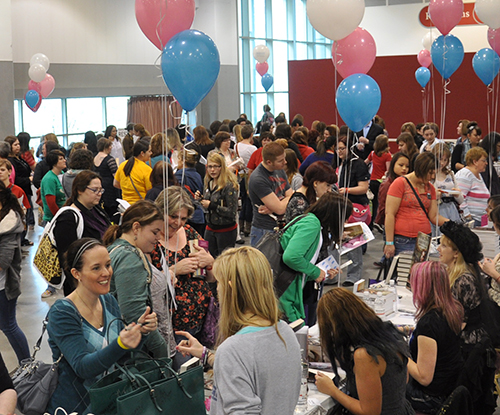
There is a stark contrast between professional authors and writers who elect to self-publish. When an author derives their living solely from the process of selling their books, they can be called an author. An author normally enjoys the ability to have physical copies of their books to do signings or giveaways..The segregation of indie writers from professional authors is starting to transcend personal perspective and now is being put into practice at conventions.
The RT Booklovers Convention recently drew 700 authors to the Grand and Mardi Gras ballrooms at the Marriott Hotel in New Orleans. The largest room was devoted to traditionally published authors and crammed into a room half the size were indie writers.
Why were self-published writers in a smaller room than traditionally published ones? The main issue was inventory. The trade authors brought stacks of books to be sold and signed. The majority of the indie writers had no physical books on them at all and were relegated to selling them via Amazon, Apple, Barnes and Noble or Kobo. A few indies also had their books available, but only for consignment.
Many indie writers complained to the organizers that they felt marginalized, this prompted an announcement that repeatedly implored attendees to go check the Indie room across the hall. One author who attended the event said “However, given that that exhortation was necessary, I can only imagine how incredibly frustrating it was for those authors to be set apart in that way. It wasn’t just indie authors, either, but many who had e-first publications through small or large traditional publishers.”
Courtney Milan attended the conference as an author and said “Rumor has it that the authors with returnable books were “real authors” and that the authors who were selling their books on a consignment basis were “aspiring authors.” As far as I can tell, this appears to have been one misinformed volunteer, rather than the official RT Convention description. It was not something that I saw or heard, and I do think it was widespread.”
Mur Lafferty was at the event and noticed “RT gave away several identifying badge ribbons. I received one that said “Published Author.” Another one I saw several people wearing was “Aspiring Author.
Smashwords really promoted the fact they had close to a hundred authors attending the event. These are desperate souls looking for validation for books that likely no one will ever read. These people raised the most rukkus citing the fact the indies had tables that were 3 feet in size, while the real authors had six.
The RT Booklovers convention did a great job separating real authors with real books from indie writers looking to sell their books on consignment. The phrase “Aspiring author” was used all over the RT Convention website to refer to unpublished writers. It is refreshing to have all of the rabble in one quantified area, rather than have everyone lumped together. Now if only digital bookstores like Amazon, Barnes and Noble or Kobo would develop indie only sections.
Michael Kozlowski is the editor-in-chief at Good e-Reader and has written about audiobooks and e-readers for the past fifteen years. Newspapers and websites such as the CBC, CNET, Engadget, Huffington Post and the New York Times have picked up his articles. He Lives in Vancouver, British Columbia, Canada.